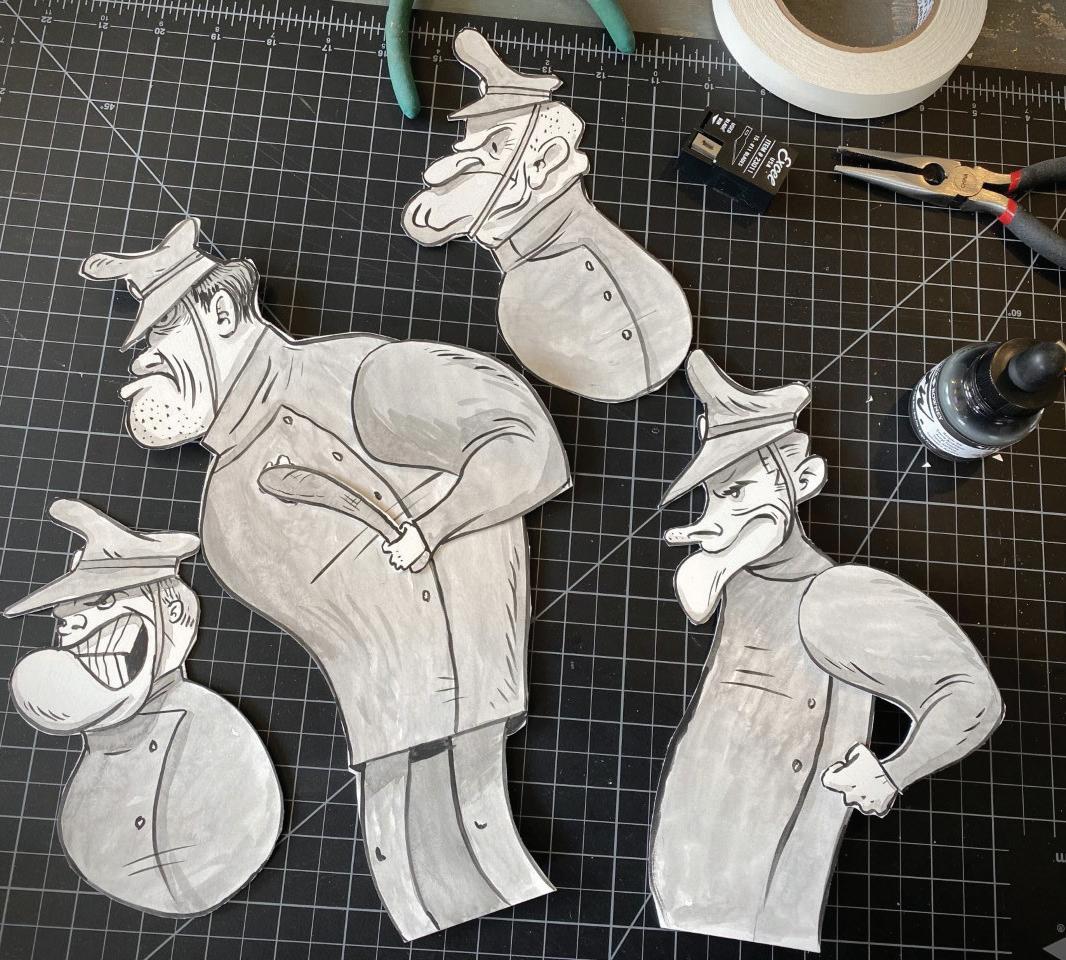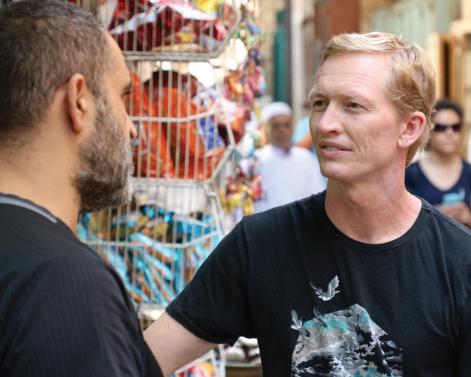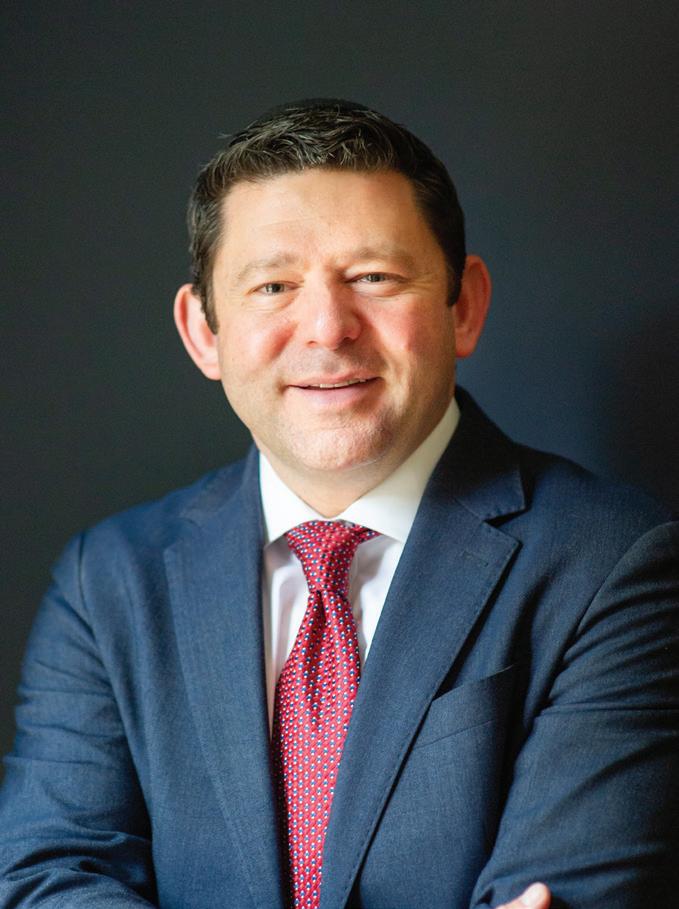
8 minute read
ART
Yiddish Puppet-based Film at Emory
Yiddish seems to be making a recent comeback among the nation’s university students, a phenomenon that might amaze Chana Shapiro their predecessors. Past generations loved Yiddish, but undoubtedly did not equate the mama loshen (mother tongue) with languages studied in edifices of higher learning.
“Labzik: Tales of a Clever Pup” is an original Theater Emory puppet production, Emory-hosted panel at which Krakovsky dents in the show’s production, narration culture in the German Studies department livestreaming from May 24 to June 5. The performed an excerpt from his one-act solo and marketing. Krakovsky manipulates with a co-appointment in the Tam Institute. show adapts a 1935 children’s book of the play “Yankl on the Moon,” based on a comic the film’s puppets, designed and fabricated “Jake’s screenwriting skill and puppetry same name by Yiddish writer Chaver Paver, Yiddish folktale. by local artist Ryan Bradburn. The original chops bring these fun, instructive stories to who developed curricula for shules, Yiddish- “Professor Udel liked the play,” Kra- Yiddish dialogue, with subtitles, is spoken life.” language after-school programs. kovsky explained, “and I performed read- by professional Yiddish actors, and student In addition to being an Emory alum,
The book’s publisher, International ings of it for her classes on Yiddish chil- Krakovsky has strong university roots. Workers Order, was a New York City dren’s literature. I first heard about the “My oldest and deepest link to Emory is my communist-affiliated mutual-aid society Labzik stories in a 2019 seminar series and great-great-great uncle Rabbi Tobias Geffen. that ran these shules for children of Jewish admired her research on modern Yiddish My grandmother, mother, aunt, sister, and a working-class families during the Great De- kid lit, which she translated and presented couple of first cousins are alumni.” pression. in her book, “Honey on the Page: A Treasury In 1919, Rabbi Geffen convinced the
Emory grad Jake Krakovsky adapted of Yiddish Children’s Literature.” We agreed Emory administration to enable religiously the script and directs the production. “This that they would make a great puppet show.” observant Jewish students, including his non-stereotypical shtetl image offers an al- At a Yiddish Book Center summer pro- own children, to matriculate without penternative to romanticized myths about Yid- gram, Krakovsky gained Yiddish language alty for missing classes on Jewish holy days dish speakers and their lives. The puppy and competency and a passion for Yiddish lit- or Shabbat. According to online sources, his family encounter labor struggles, peace- erature and culture. Subsequently, Udel and Geffen played a catalyst role, which led to ful protest, racism, police brutality, even an Krakovsky revisited the idea of a Labzik ad- today’s large Jewish enrollment. Perhaps the episode involving a terrible airborne dis- aptation. Krakovsky presented the idea to Yiddish Political Theater seminar is a result ease. The stories also present secular Jews Theater Emory, and Udel received support of Rabbi Geffen’s imprint on Emory 100 putting Jewish values into practice.” from the Tam Institute for Jewish Studies years ago.
Krakovsky is an Atlanta actor, director, and Emory German Studies department, narrators voice Udel’s English translation. playwright and puppeteer who is a teaching who agreed to co-sponsor a new class, Yid- “It is uncanny how aptly these stories associate working with professor Miriam dish Political Theater. from 1935 speak to concerns of our time, Udel in a new seminar at Emory Univer- Krakovsky adapted Paver’s Yiddish sto- and in lively language that our children sity, Yiddish Political Theater. They first ries using Udel’s English translation for a bi- can understand,” said Udel, associate promet in 2014, as participants on a Theater lingual puppet film, involving seminar stu- fessor of Yiddish language, literature and
The 1935 children’s book “Labzik: Tales of a Clever Pup” is the basis of the new puppet film. Jake Krakovsky manipulates puppets made by Ryan Bradburn. Jake Krakovsky with central puppet film character Labzik.



Miriam Udel teaches Yiddish Political Theater seminar at Emory.
Watch a free screening of “Labzik: Tales of a Clever Pup” at www.theater.emory.edu/ home/shows-events/current-season/labzik. html. The on-demand streaming video will be available from May 24 to June 5. ì

NEW IN DUNWOODY!
Non-Invasive pain management for Weekend Warriors of all ages.
• Walk-in care from a board certified orthopedic surgeon • One visit for both your evaluation and treatment
• Taking the hassle out of modern day healthcare • Easy access & free parking
All insurance accepted
“It is time to get back to old style medicine where a board certified orthopedist sees you, evaluates you, and cares for you.”
- Dan Richin & Dr. Paul Richin, MD
1705-B Mt. Vernon Rd Dunwoody, GA 30338 (across from Dunwoody Village)
ART
New Film Aims to Rekindle Christian-Jewish Dialogue
By Bob Bahr

“Hope In The Holy Land,” a new documentary which debuts May 14, Israel Independence Day, seeks to broaden the dialogue between Christians and Jews about the future of Israel.
The film was produced by two Christian Zionists with more than a decade of experience, leading pilgrimages to Israel and discussions about the role that Palestinians, both Muslim and Christian, play there.
Justin Kron, one of the creators of the film, is particularly concerned about addressing the criticism of Israel in recent years among a number of mainline Protestant denominations. Kron is distressed by the way Israel’s relationship with Palestinians has been portrayed.
“Within the Protestant community there is a growing skepticism towards Israel’s legitimacy, toward Israel’s perceived treatment of the Palestinian people. I think they see Israel more and more as a foreign colonialist movement that illegally stole land from the Arabs. And because of that there is less and less support for Israel.”
The hope that is the subject of “Hope In The Holy Land” is what Kron sees as the important role that Palestinians can play when they recognize Israel’s right to exist and abandon what he sees of the “party line” of militant Palestinians in Hamas in Gaza and the Palestinian Authority on the West Bank.
“Hope resides in those courageous Palestinians who are willing to step across the line to love their neighbor, to see that the other is a human being who deserves to be treated with dignity and to be heard, when we see Israelis and Palestinians working together it gives us great hope. Until the majority of Palestinians agree that Israel has the right to exist, we are not going to see peace between the two peoples.”
The film follows a California Evangelical religious leader, Todd Morehead, as he travels to Israel and the West Bank to sample a broad cross section of public opinion about the future prospects for peace.
He concludes that Palestinian Christians, while they represent a minority with a problematic future, have an important role to play in changing the discussion about the future.
“I believe that if Palestinian Christians recognize the Jewish roots of their faith and God’s plan for the future of Israel that would be the key for God to do something extraordinary to heal the rift between the two peoples.”
Kron, who has been working to finance and develop the film project since 2014, is hoping that it will help to defuse some of the heated rhetoric that has often characterized discussion about the Jewish state among religious leaders and their followers.
“We definitely want to bring more light than heat to the subject. We think there is a polarization that comes with the subject. Christians on both sides of the issue need to be challenged to see what life is really like for those on the ground.”
While the film represents a thoroughly Christian viewpoint, it was largely financed by the Philos Project, which is backed by Paul Singer, a wealthy Jewish Wall Street fund manager who has a deep commitment to Israel.
The Philos Project works closely with Christian supporters of Israel to fund visits and internships there, to sponsor publications and projects like the documentary and to create a greater awareness of Israel among Christians here.
In February, the Philos program sponsored a visit by Israel’s Ambassador to the United States Gilad Erdan to Charleston, S.C., and Montgomery, Ala., to learn more about African American history and religion in the South. It was Erdan’s first trip in this country as ambassador.
The film has been welcomed by such prominent commentators as the Israeli writer Yossi Klein Halevi who described it as “beautiful, nuanced and morally sensitive.”
It’s also been supported by David Gordis, the prominent Israeli historian and commentator who served as a consultant on the production.
The documentary comes at a time of considerable uncertainty in both the Palestinian and Israel Arab communities. Mahmoud Abbas, who has been the autocratic leader of the Palestinians since 2006, recently abruptly canceled elections that were widely seen as a step toward a more democratic future for the West Bank.

“Hope In the Holy Land” chronicles the visit to Israel and the West Bank by an American Christian Todd Morehead.
Above, using outdoor advertising in Arabic, Prime Minister Benjamin Netanyahu made an extraordinary appeal to Arab voters in this year’s election.

Left, the documentary promotes the idea that the key to peace lies in those Palestinians willing to recognize Israel’s right to exist.
In Israel, Arab political participation in the country’s recent election dropped significantly. The Arab Joint List, which had been the third-largest political bloc in the Knesset, lost three seats in this year’s election amid considerable apathy among Arab voters.
Despite a strong campaign for their votes, including an unprecedented political appeal by Prime Minister Benjamin Netanyahu, there were at least 250,000 fewer Israeli Arabs who voted this time. ì










